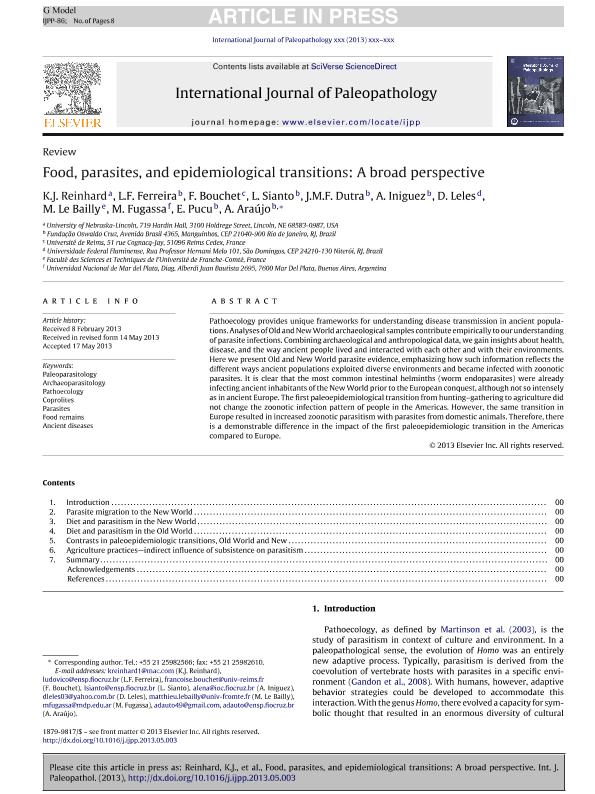Mostrar el registro sencillo del ítem
dc.contributor.author
Reinhard, K. J.
dc.contributor.author
Ferreira, L. F.
dc.contributor.author
Bouchet, F.
dc.contributor.author
Sianto, L.
dc.contributor.author
Dutra, J. M. F.
dc.contributor.author
Iniguez, A.
dc.contributor.author
Leles, D.
dc.contributor.author
Le Bailly, M.
dc.contributor.author
Fugassa, Martín Horacio

dc.contributor.author
Pucu, E.
dc.contributor.author
Araújo, A.
dc.date.available
2018-08-03T14:23:45Z
dc.date.issued
2013-09
dc.identifier.citation
Reinhard, K. J.; Ferreira, L. F.; Bouchet, F.; Sianto, L.; Dutra, J. M. F.; et al.; Food, parasites, and epidemiological transitions: A broad perspective; Elsevier Science; International Journal of Paleopathology; 3; 3; 9-2013; 150-157
dc.identifier.issn
1879-9817
dc.identifier.uri
http://hdl.handle.net/11336/54048
dc.description.abstract
Pathoecology provides unique frameworks for understanding disease transmission in ancient populations. Analyses of Old and New World archaeological samples contribute empirically to our understanding of parasite infections. Combining archaeological and anthropological data, we gain insights about health, disease, and the way ancient people lived and interacted with each other and with their environments. Here we present Old and New World parasite evidence, emphasizing how such information reflects the different ways ancient populations exploited diverse environments and became infected with zoonotic parasites. It is clear that the most common intestinal helminths (worm endoparasites) were already infecting ancient inhabitants of the New World prior to the European conquest, although not so intensely as in ancient Europe. The first paleoepidemiological transition from hunting-gathering to agriculture did not change the zoonotic infection pattern of people in the Americas. However, the same transition in Europe resulted in increased zoonotic parasitism with parasites from domestic animals. Therefore, there is a demonstrable difference in the impact of the first paleoepidemiologic transition in the Americas compared to Europe. © 2013 Elsevier Inc.
dc.format
application/pdf
dc.language.iso
eng
dc.publisher
Elsevier Science

dc.rights
info:eu-repo/semantics/openAccess
dc.rights.uri
https://creativecommons.org/licenses/by-nc-sa/2.5/ar/
dc.subject
Ancient Diseases
dc.subject
Archaeoparasitology
dc.subject
Coprolites
dc.subject
Food Remains
dc.subject
Paleoparasitology
dc.subject
Parasites
dc.subject
Pathoecology
dc.subject.classification
Historia

dc.subject.classification
Historia y Arqueología

dc.subject.classification
HUMANIDADES

dc.title
Food, parasites, and epidemiological transitions: A broad perspective
dc.type
info:eu-repo/semantics/article
dc.type
info:ar-repo/semantics/artículo
dc.type
info:eu-repo/semantics/publishedVersion
dc.date.updated
2018-07-11T14:43:08Z
dc.journal.volume
3
dc.journal.number
3
dc.journal.pagination
150-157
dc.journal.pais
Estados Unidos

dc.journal.ciudad
Nueva York
dc.description.fil
Fil: Reinhard, K. J.. University of Nebraska; Estados Unidos
dc.description.fil
Fil: Ferreira, L. F.. Fundación Oswaldo Cruz; Brasil
dc.description.fil
Fil: Bouchet, F.. Université de Reims; Francia
dc.description.fil
Fil: Sianto, L.. Fundación Oswaldo Cruz; Brasil
dc.description.fil
Fil: Dutra, J. M. F.. Fundación Oswaldo Cruz; Brasil
dc.description.fil
Fil: Iniguez, A.. Fundación Oswaldo Cruz; Brasil
dc.description.fil
Fil: Leles, D.. Universidade Federal Fluminense; Brasil
dc.description.fil
Fil: Le Bailly, M.. Universite de Franche-Comte; Francia
dc.description.fil
Fil: Fugassa, Martín Horacio. Consejo Nacional de Investigaciones Científicas y Técnicas; Argentina. Universidad Nacional de Mar del Plata; Argentina
dc.description.fil
Fil: Pucu, E.. Fundación Oswaldo Cruz; Brasil
dc.description.fil
Fil: Araújo, A.. Fundación Oswaldo Cruz; Brasil
dc.journal.title
International Journal of Paleopathology
dc.relation.alternativeid
info:eu-repo/semantics/altIdentifier/doi/https://dx.doi.org/10.1016/j.ijpp.2013.05.003
dc.relation.alternativeid
info:eu-repo/semantics/altIdentifier/url/https://www.sciencedirect.com/science/article/pii/S1879981713000491
Archivos asociados
